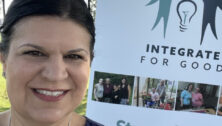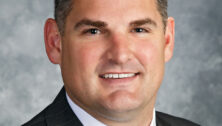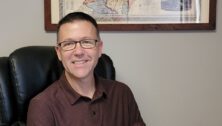Bucks County Leadership: Rachel Bowen, Vice President of Enrollment Management, Harcum College
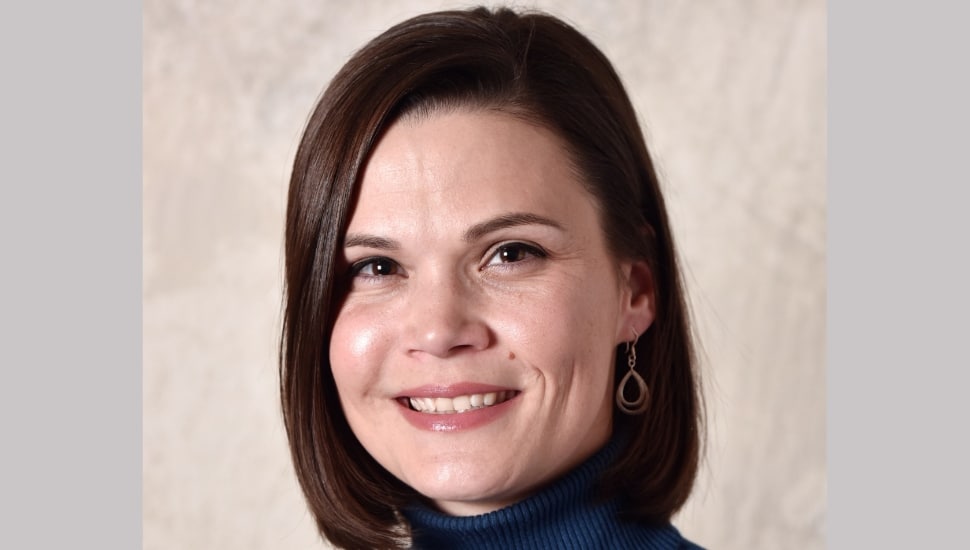

Rachel Bowen, Vice President of Enrollment Management at Harcum College, spoke with BUCKSCO Today about growing up in Northeast Philadelphia, where her parents and a high school job at a nursing home for nuns helped her develop a strong work ethic. She also became interested in video production as a teenager, which shaped her decision to attend DeSales University.
Bowen shared how she got into the higher education admissions field, what sets Harcum apart from other Philadelphia-area colleges, and how she still uses her video production experience in her current job.
Where were you born and where did you grow up, Rachel?
I was born, the youngest of two girls, in Northeast Philadelphia.
What did your parents do?
My dad worked for a security company his entire career which installed alarm systems. My mom originally worked in retail for a little while but then transitioned to the corporate environment working for Comcast for a number of years.
What do you remember about growing up in Northeast Philadelphia?
I feel like I had a very traditional upbringing. My parents both worked a lot, so I spent a lot of time with my older sister. She was such a good student, and she would help me with my homework or a project that I needed help with. Over the summer, we had a community pool that we went to every day, which was so much fun. I have many great memories from this time of my life.
Did you play any sports in high school or when you were a kid?
I played soccer when I was a kid for one year. My dad decided he would take on the role of assistant coach and sign me up. But then he was mortified because I decided that it didn’t make sense to run back and forth on the field if the team was going to come right back in the same direction. I was trying to take the “work smarter, not harder” approach to athletics.
I did play softball for a number of years in Little League and up until just before high school. Softball seemed to suit me much better, and I was pretty good at it. I definitely enjoyed it more than soccer.
How did you distinguish yourself in high school?
I don’t feel like anything made me stand out. I do remember that I went to a private school in Philadelphia, St. Hubert Catholic High School for Girls, so my parents had to pay for tuition. I made a point to always take every elective I could, instead of getting out early or having study hall because they were paying all that tuition. Looking back, I’m really proud that at such a young age, I pushed myself to take advantage of those extra opportunities.
Interesting. And what kind of music were you listening to in high school and college?
I’ve always leaned towards more alternative music. As I’ve gotten older, those bands have stayed with me.
What was the first album that you purchased?
One of the first CDs I got was a Matchbox 20 CD, which I feel has defined — I joke with my husband — a lot of my life. There was a song on it that I added to a video, which inspired me to go into video and television production in college. That’s where I met my husband. If I had never got that album, I don’t know if I would have gone to college for that major, and then I might not have met my husband.
Did you work in high school and college?
My very first job was a retail job. I worked at Strawbridge’s, which turned into Macy’s.
Then I got a job working in a nursing home for retired nuns. The hours were 3-7:00 PM, so it gave me time to work right after school, but also allowed me time to do homework. This job was physically demanding since it involved a lot of heavy lifting and cleaning. I’m so grateful, looking back, that I had this position because it really instilled in me the value of hard work and that it isn’t always easy.
Were you a good student?
I never had the drive to want to be an ‘A’ student or have perfect grades. I didn’t mind if I was average as long as I felt like I was doing my best. It was important to me to always be moving forward, so I would set tiny goals for myself to stay motivated and productive.
Where did you end up going to college?
DeSales University — it’s in Center Valley near Allentown.
Why there?
I was trying to figure out what I wanted to do, and one year, I got a video camera for Christmas. Instead of just videotaping memories, I decided I wanted to make videos. It’s much more prominent now, but back then, television and film production wasn’t a very well-known major. I remember looking at schools that offered that, and DeSales came up. It was also more local since I was in Philadelphia. The thought never crossed my mind that I would go out of state or somewhere far.
Did DeSales turn out to be a good choice for you?
Definitely, because my work-study job was in admissions. It all came full circle; it led me there to get the creative outlet I needed but also gave me the structure for what I would do in my career in higher education admissions. When I started in the admissions office, I just wanted a job. I thought giving tours was the coolest thing you could do on campus. At my college, it was also a prestigious and hard job to get. And oddly enough, it led me to my career.
Do you still dabble in the creativity and video?
It’s really nice how video and creativity overlap with my job at Harcum. We create videos for everything now. Students don’t want to read emails; they want everything to be delivered in a format where it’s explained to them in a way they can digest better. That’s not why I went into TV and film, but it has overlapped.
The nature of what I do is sales. We may not do the actual video production, but I’m part of the writing and production and helping to tailor the video to answer questions like, “What are we trying to sell? How do we want to sell it?”
So, who saw promise in you and opened up doors?
It’s interesting; it wasn’t someone who even knew me. This was back in the day when CareerBuilder was the big platform for job searching. I had a random headhunter reach out to me. I was trying to figure out what to do next. Most of my classmates were either going to New York or L.A. That’s what you had to do if you majored in TV and film.
When the headhunter reached out to me because he saw that I had admissions experience, I thought I would try out working in admissions until I figured out what I wanted to do in TV/film. I never expected that this would be my career, but I’m so glad it turned out the way it did.
Who else saw promise in you?
Honestly, the person who gave me the opportunity here at Harcum College. I’d been trying to get out of for-profit education. I love the idea of helping people through higher education, but I wanted it to be more like my experience at a nonprofit, traditional college.
I had been trying for years to find something different. A lot of people did not look favorably on for-profit experience. I wanted to get into a traditional school environment, and I felt that a lot of people weren’t giving me that opportunity because they viewed for-profit as not on the same level.
When I interviewed here at Harcum 16 years ago, our college president gave me an opportunity. It’s important for him to meet every new employee. I remember him saying, “I love that you have for-profit experience,” because if you’re trying to grow — even at a nonprofit — you want opportunities and you need funding to expand and offer more things to your students. He added, “I like that you understand the sales aspect, that you know how to market and sell an institution.” He was the first person who really valued my prior experience.
Was Harcum’s nonprofit environment a better fit for you?
Yes, definitely. It’s changed a bit recently because it’s so much more competitive. Students have many more options, so everyone’s vying for the same students, and it makes it challenging. You want to make sure it’s going to be the right fit for a student, but at the same time, you’re trying to make sure that you’re still relevant and surviving this challenging moment in higher education.
The messaging right now isn’t as positive. People are asking, “What’s the value of higher education? Is it necessary?” There’s a lot of conflicting information out there, so you’re working against that. But if you’re passionate about it, you don’t feel like you’re selling. I feel like I’m just spreading a message of an opportunity to help students reach their goals and find a career they are also passionate about. There is so much data out there that shows having a degree will make you more employable.
We’re a little bit more than halfway through the year. What are the projects and priorities that you’re focused on at Harcum College?
We’re working on our fall class right now. We’re still trying to get that settled, and then we’ll be working on our fall ’25 class. Students expect applications to be online for the upcoming year in August, which is interesting because we’re still trying to finish fall ’24, but we have to be ahead of fall ’25. In the nature of a junior college, we get a lot of last-minute students. There’s never downtime; it’s a year-round process.
We’re also going through a reaccreditation. We have to do it every 10 years. There’s a preliminary visit this fall, and we have our main visit in the spring. It’s a big deal. You spend two years preparing for it. That’s coming up and coming to an end at this point.
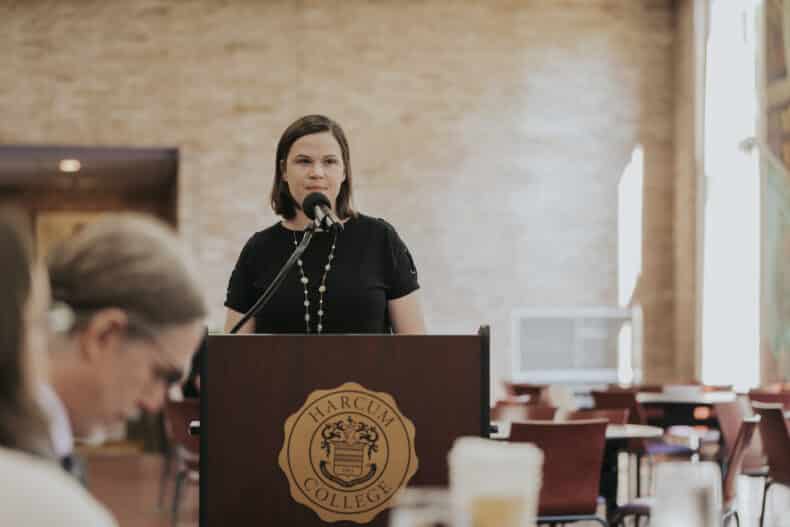
What’s the biggest change that’s happened over your 16 years at Harcum, Rachel?
I started in ’08 during the recession, and you almost couldn’t keep up with everything. All of a sudden, everybody wanted to go back to school, and you’re trying to make sure that you can accommodate everybody. We were struggling to have seats for students because it was filling up so fast. And then navigating the pandemic and deciding what modality to use to make sure people are safe and students are still getting the education that they expect and the jobs they expect to get.
But the main thing is seeing how competitive it has become with colleges, especially in the Philadelphia area. There are so many choices that you’re trying to figure out a way to make sure you stand out.
That’s why I really like Harcum — we’re different. We’re an independent, two-year option, which makes us different from the colleges around us. I think it’s good if you’re concerned about cost because you can do it in two years, but you still get the four-year experience because we have residential housing.
What do you do with all your free time?
I enjoy spending time outdoors and going for walks. I’m also a fan of television, film, and a lot of movies and shows. In that sense, I’m definitely a homebody.
What’s the last show you binged?
I got really into American Horror Story. I never watched a show that was an anthology, where each season is different and the same actors play different characters. I found it fascinating to see someone play a young high school student in the ’90s and then portray an older person who manages a hotel from the 1920s.
What keeps you hopeful and optimistic? It’s a crazy world out there.
There’s so much opportunity for people to get a good career that makes them happy. There’s a lot more focus now on doing something that makes you feel fulfilled. I don’t feel like people are chasing the dollar as much.
I still think money is a big part of it, but I think the pandemic made us reflect on what’s important because we got to work from home. People value family more and what makes them happy.
People used to put work in a box, thinking you’re not going to enjoy it — you’re just doing it to get paid so that you can live. But now, I think it’s important for people to have a career they love. Working in higher education, we’re that conduit to get them there.
Not only that, but it describes you perfectly. You really like what you’re doing.
Oh, yeah. If you can enjoy what you do and get paid for it, I don’t think there’s anything greater than that. I feel like my father never enjoyed his work, and he brought it home with him, that feeling of frustration. And maybe, subconsciously, I didn’t want to feel like that. It was important to find something that I enjoyed.
Finally, Rachel, what’s the best advice you’ve ever received?
I can think of two pieces of advice. One was personally given to me, and the other is from a famous person who shared it on a podcast, which I also found very meaningful.
The personal advice was given when I was in school and dealing with a lot of anxiety. I’m still a very anxious person. They had therapy programs for kids in school, and I told the counselor, “This person makes me feel this way,” because that was what was driving my anxiety — how certain people, like different teachers, were making me feel worried about things. And he said, “You choose how you feel.”
Taking responsibility for myself, knowing that I’m subconsciously making these decisions, transformed everything. I then looked at it like, “Okay, this person’s not making me feel anxious. I’m choosing to feel anxious in front of this person.” And it applies to so many things, like, “I’m choosing to feel offended.” It allowed me to take responsibility for my emotions. I don’t have to be upset by this. I can choose to feel happy about this.
The other advice I remember was that no matter what job you have, be the best you can at it. Even if it’s not the job you think you want, do your best because that’s how you get where you want to go.
Success will breed success. It’s going to lead to something else, but only if you do your best at it.
Connect With Your Community
Subscribe for stories that matter!
"*" indicates required fields


























